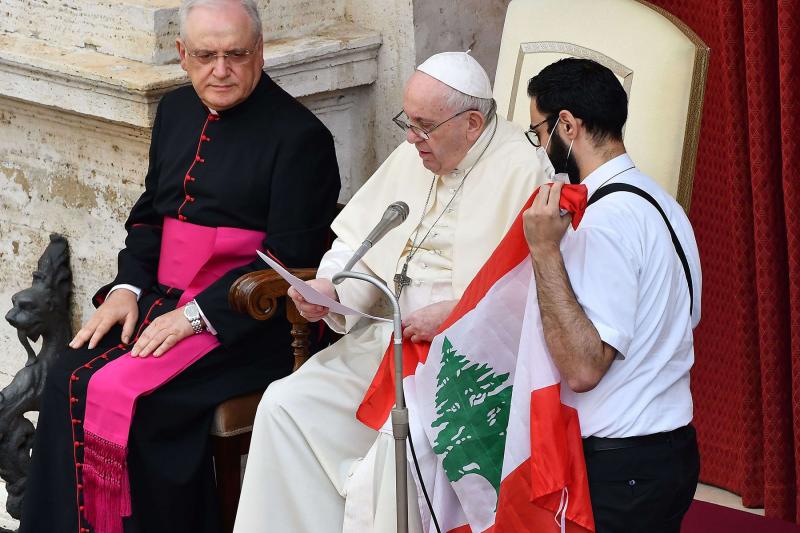Open Letter To Pope Francis
Elie Aoun/June 21/2021
ايلي عون: رسالة مفتوحة إلى قداسة البابا فرنسيس
The declared purpose of the July 1st meeting in the Vatican (with the principal leaders of the Lebanese Christian community) is to reflect “on the worrying situation in the country and to pray together for the gift of peace and stability.”
As a Christian, I respectfully present this letter with the aim of correcting certain “errors” committed by the Church institution – primarily (1) its support for the Taif Agreement, (2) its selection process of Lebanese presidential candidates, and (3) its adherence to certain faulty concepts.
Firstly, the Taif Agreement proved to be a failure for Lebanon because it offered a “cure” for a faulty diagnosis. The presumption was to reduce “Maronite presidential authority” – at a time when the real problem was not the authority itself but the character of the individuals who attained the presidency.
The real cure should have been to elevate quality Christians to the office of the President. Instead of doing so, the Church supported the Taif amendments which have been nothing more than sharing authority between three unqualified presidents. Instead of one unfit Christian, we now have a Christian, a Sunni and a Shiite who are equally unfit – leading to the status quo of general inaptitude and corruption.
The solution for Lebanon is to restore the authority of the Lebanese president, and be given to a qualified Christian. Otherwise, what is the meaning of Christian-Muslim “partnership” in the region if the only Christian president has no meaningful authority?
In the entire Arab world, Arab Christians do not behave in the same manner as some Sunni, Shiite, and Druze leaders did in Lebanon.
Arab Christians do not revolt against their governments, do not seek more political influence, and do not align with foreign powers against their own countrymen. Instead, they make whatever positive contributions that they could, with total respect towards the governments and people wherever they live. That same attitude has to be accepted by Lebanese Muslims in Lebanon whose individual rights as citizens should also be protected.
In the same manner that Lebanese Muslims cannot be all responsible for decisions made by their leaders, the same can be said about the Christians especially since the “Maronite president” is elected by a large number of Muslim parliamentarians who should equally share responsibility for the conduct of whoever they vote for.
Secondly, during the last presidential election in Lebanon, Bkirki “adopted” four presidential candidates from four “Christian political parties.” Although each of these candidates has some public support, Bkirki’s “presidential selection” should have been wiser than that of the “common people” and realize that these candidates, and the leaders of the political parties, are not qualified for the presidency.
The Lebanese President should be selected by the Lebanese Parliament, not by a religious leader. However, in reality, the clergy (for both Christians and Muslims) rule the country. The Shiites are led by a clergyman. The Sunnis act in coherence with their Mufti, and all Christian political parties claim to be under the “umbrella of Bkirki.”
The clergy do support the Lebanese political parties despite their public rhetoric against the politicians and their deeds.
Therefore, the clergy are partly to blame for the Lebanese status quo and must pursue “corrective measures” if peace and stability are to be restored.
When God selected David to be a king of Israel, He looked at David’s heart – not his “strength” or his popularity. In the same manner, when the Vatican and Lebanese clergy “choose” a politician, they need to reflect at that person’s heart towards his people, constructive vision for the country, and adherence to accurate principles. This is the type of leadership that the country needs. However, the Christian and Muslim clergy are contributing to the demise of Lebanon by supporting Lebanese politicians who lack these criteria.
Thirdly, the Vatican’s agenda is supportive of the so-called New World Order, a one-world bank, a unified educational system, and other concepts which are contradictory to national sovereignty – for both Lebanon and the Vatican state.
Also, the slogan that “Lebanon is a message” is not in itself true. If the “message” is co-existence, there are many countries whose various religious and ethnic communities live in a far better harmony and prosperity than in Lebanon.
Instead of being labeled as a “message,” Lebanon is a republic which can prosper or diminish depending on the principles that guide it and the character of the individuals who lead it.
Furthermore, there had been ceremonies aimed at placing Lebanon “under Mary.” There is no Biblical support for such a measure. The real Mary, mother of Christ, has no political ambition. Even if she did, and even if Lebanon is truly “under Mary”, the result would not be political and economic bankruptcy.
The “Christian” clergy have twisted the teachings of the Bible and transformed the focus from the Creator Father to a Mary-centered system.
The “Muslim” clergy are not any different. One example is Hizballah’s use of the phallic symbol (on its flag) in the word Allah. Does Allah approve of the phallic symbol, the acts of terrorism, and the “export” of captagon?
In summary, the religious corruption is the cause of the political and economic corruption, and it must be corrected.
The “message” that Lebanon conveys to the world today is how to destroy a nation-state to the benefit of the New World Order. How could globalists “acquire” Lebanon without first ruining it to justify their take-over?
The destruction of Lebanon is intentional, and the clergy (Christian and Muslim) are co-conspirators against the country – until they prove otherwise by their deeds and not just rhetoric.
Nations and rulers interacted with popes over centuries. They would not do so if the Vatican did not have political influence. Has this political influence been used to benefit Lebanon in any constructive way in the last fifty years or so? Personally, I do not believe so.



















